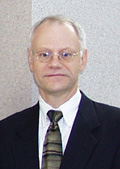In an effort to capitalize on its growing expertise in the area of bioterrorism preparedness, the University of Nebraska will establish a university-wide Center for Biosecurity to be administered at UNMC.
The University of Nebraska Board of Regents approved the proposal Saturday.
The Center for Biosecurity will be a collaborative effort involving UNMC as well as the other three University of Nebraska campuses – the University of Nebraska-Lincoln, the University of Nebraska at Omaha and the University of Nebraska at Kearney.
Collaborative effort
 “It’s anticipated that the federal government is going to set aside billions of dollars to help fund bioterrorism preparedness initiatives,” said Steven Hinrichs, M.D., professor of pathology and microbiology at UNMC, director of the Nebraska Public Health Laboratory and the individual who would serve as director of the Center for Biosecurity. “To compete successfully for these programs, it is absolutely essential that universities demonstrate that they are capable of performing cross-disciplinary research, education and clinical and community outreach services.
“It’s anticipated that the federal government is going to set aside billions of dollars to help fund bioterrorism preparedness initiatives,” said Steven Hinrichs, M.D., professor of pathology and microbiology at UNMC, director of the Nebraska Public Health Laboratory and the individual who would serve as director of the Center for Biosecurity. “To compete successfully for these programs, it is absolutely essential that universities demonstrate that they are capable of performing cross-disciplinary research, education and clinical and community outreach services.
“This is research that deals with the many different aspects of bioterrorism, including human health, food safety and water safety. By creating the Center for Biosecurity, it will allow us to tap into the outstanding expertise and uniqueness of each campus to produce a multi-service unit that will be able to respond to grant opportunities and other initiatives that result from these federal dollars set aside for bioterrorism preparedness.”
Center’s budget
It is projected that the center will have a budget of $287,850 for the first three years of operation. This breaks down to $97,000 the first year, $94,250 the second year, and $96,600 the third year. After that, it is anticipated that the center will be supported by extramural grants and contracts.
The money will be used to purchase computer equipment and to pay the salaries of a full-time secretary, a half-time administrative assistant and a portion of Dr. Hinrich’s salary.
Leading the way
“The primary goal of the center will be to serve the state of Nebraska and the nation by bringing together the university’s expert scientists and clinicians to address the many facets of biosecurity,” said UNMC Chancellor Harold M. Maurer, M.D. “The university has already established itself as a leader in bioterrorism preparedness. The center will put us in an even stronger position to meet the clinical, educational and research needs of the public.”
On Nov. 1, Gov. Tom Ridge, former governor of Pennsylvania and advisor for the Office of Homeland Security, visited UNMC to get a first-hand look at what the university and the state of Nebraska have done to become a leader in bioterrorism preparedness. The university is hoping to
establish a National Emergency Preparedness Laboratory in Omaha to augment the federal government’s Centers for Disease Control and Prevention.
Components of the Center
Some of the components of the Center for Biosecurity would be:
- Research on biodefense and biosecurity related problems in animal and human health.
- Novel demonstration projects for active surveillance of public health in the U.S., particularly in rural areas.
- State-of-the-art technology approaches to detect bioterrorism agents, identify emerging infectious diseases, maintain communication with health-care professionals, and track sources of antibiotic resistance.
- Patient care services and infectious disease control.
- A common communication system throughout the state for use by public health and health-care providers.
- Educational programs throughout the state to provide training for medical personnel, food production workers and academicians.
- Coordination of educational efforts with teacher training programs and the state college system.
- Educational programs directed to farm families, protection of the food supply, and emergency response in rural areas of the state.
Building state, federal relations
“The Center for Biosecurity will serve as a focal point for building state and federal government relationships,” Dr. Hinrichs said. “Our Nebraska programs have been consistently recognized for this in the past, and the center will greatly enhance our ability to continue to strengthen these relationships.”
The center will have an Internal Advisory Committee made up of key faculty and administrative staff from each campus. The IAC will advise Dr. Hinrichs regarding strategies for enhanced intercampus collaboration and planning as well as approaches to enhance partnerships with federal agencies and to acquire extramural support.